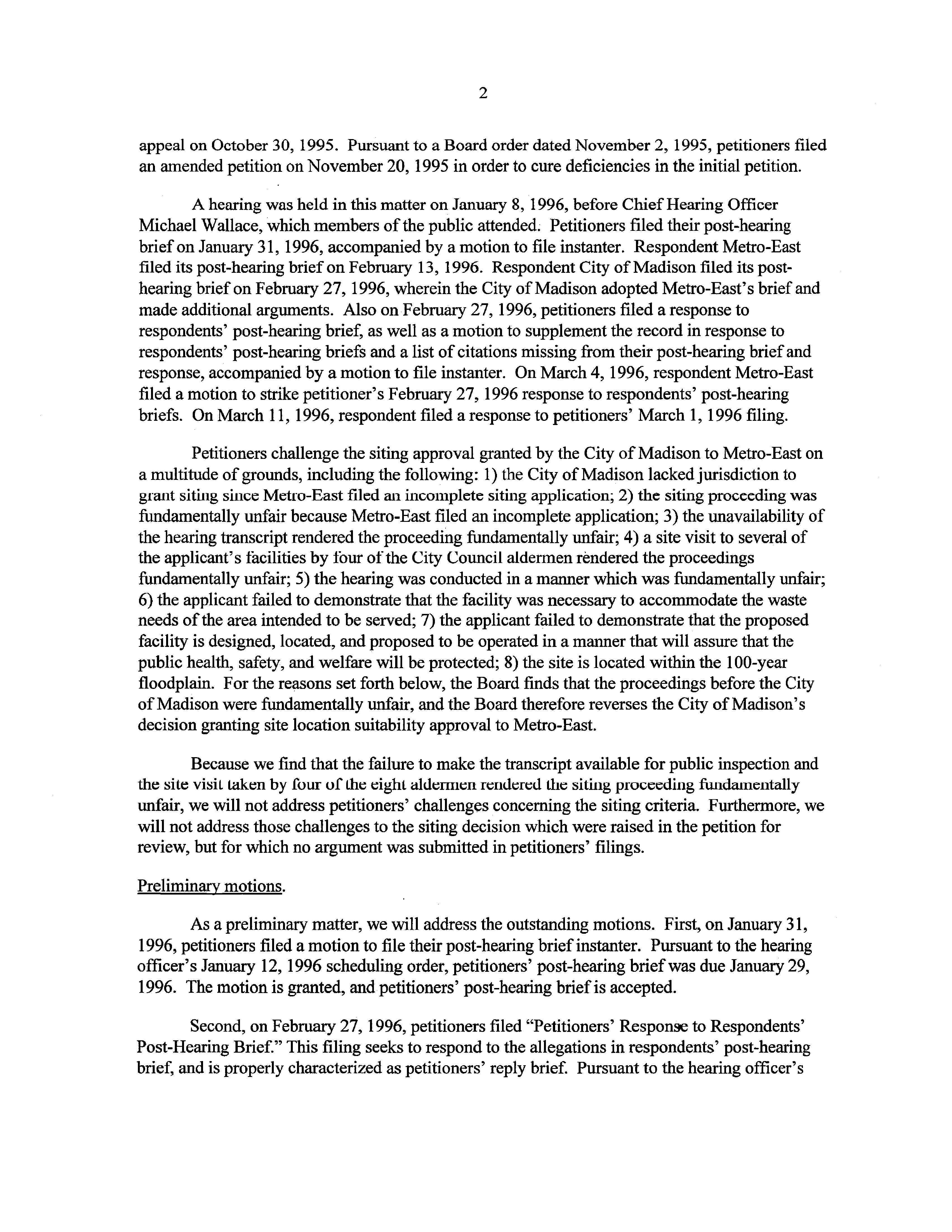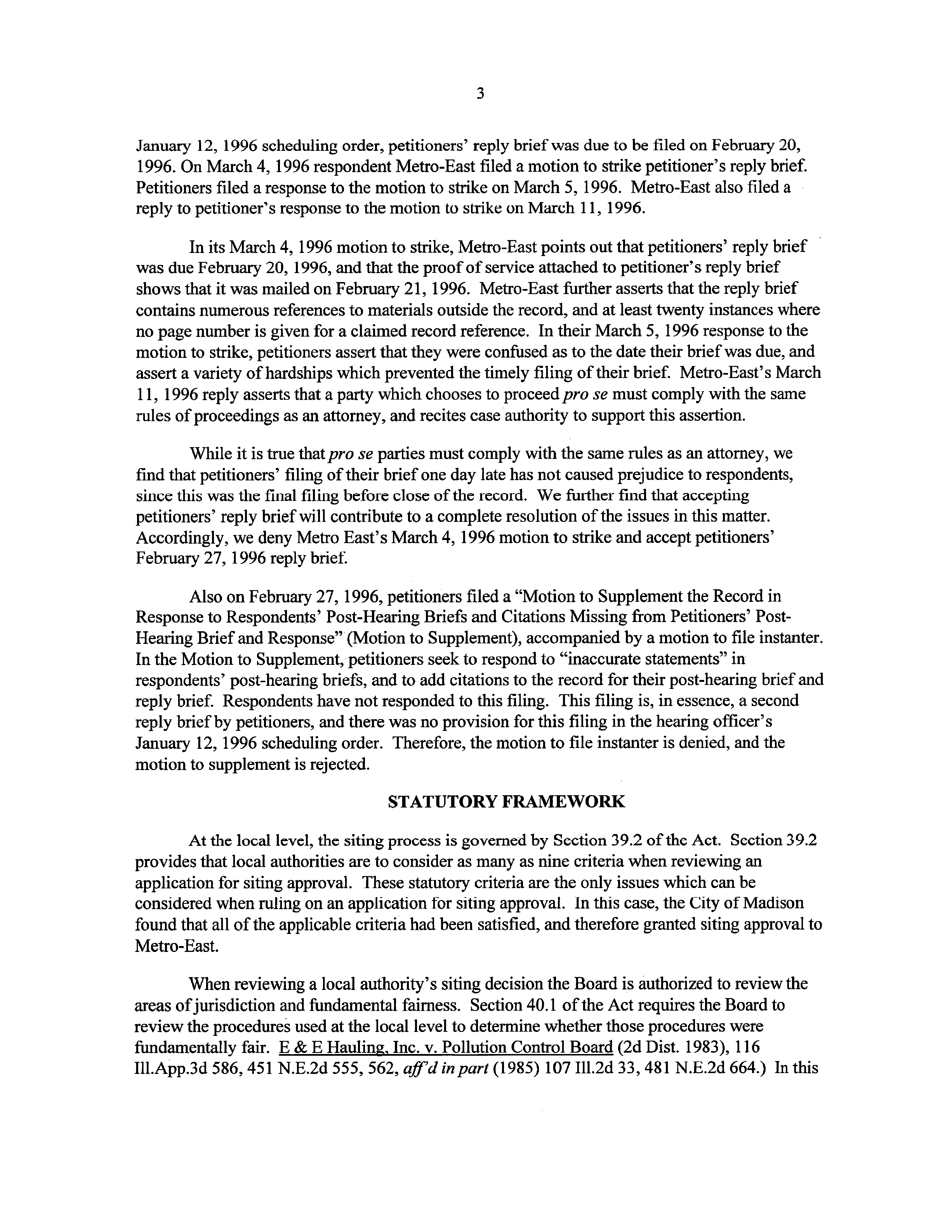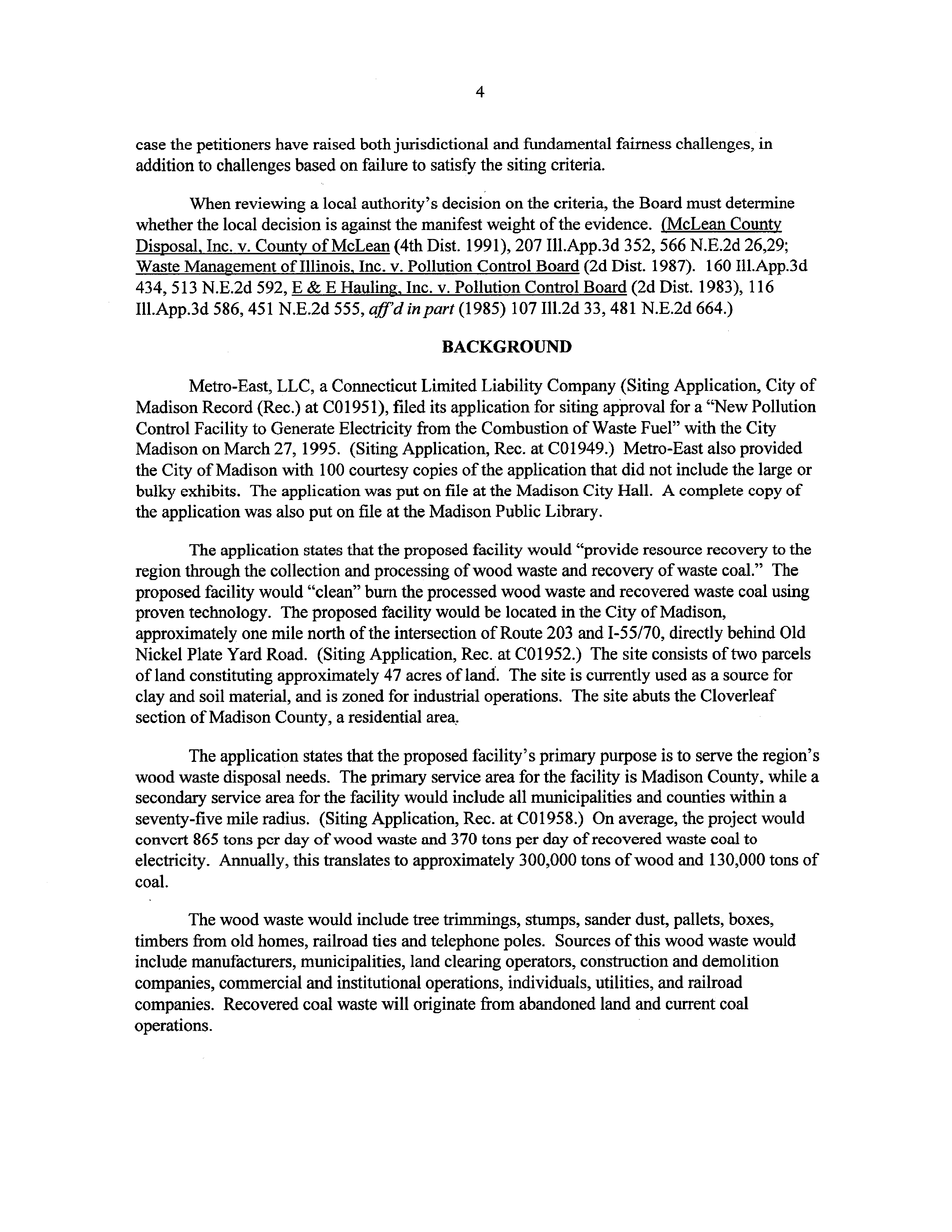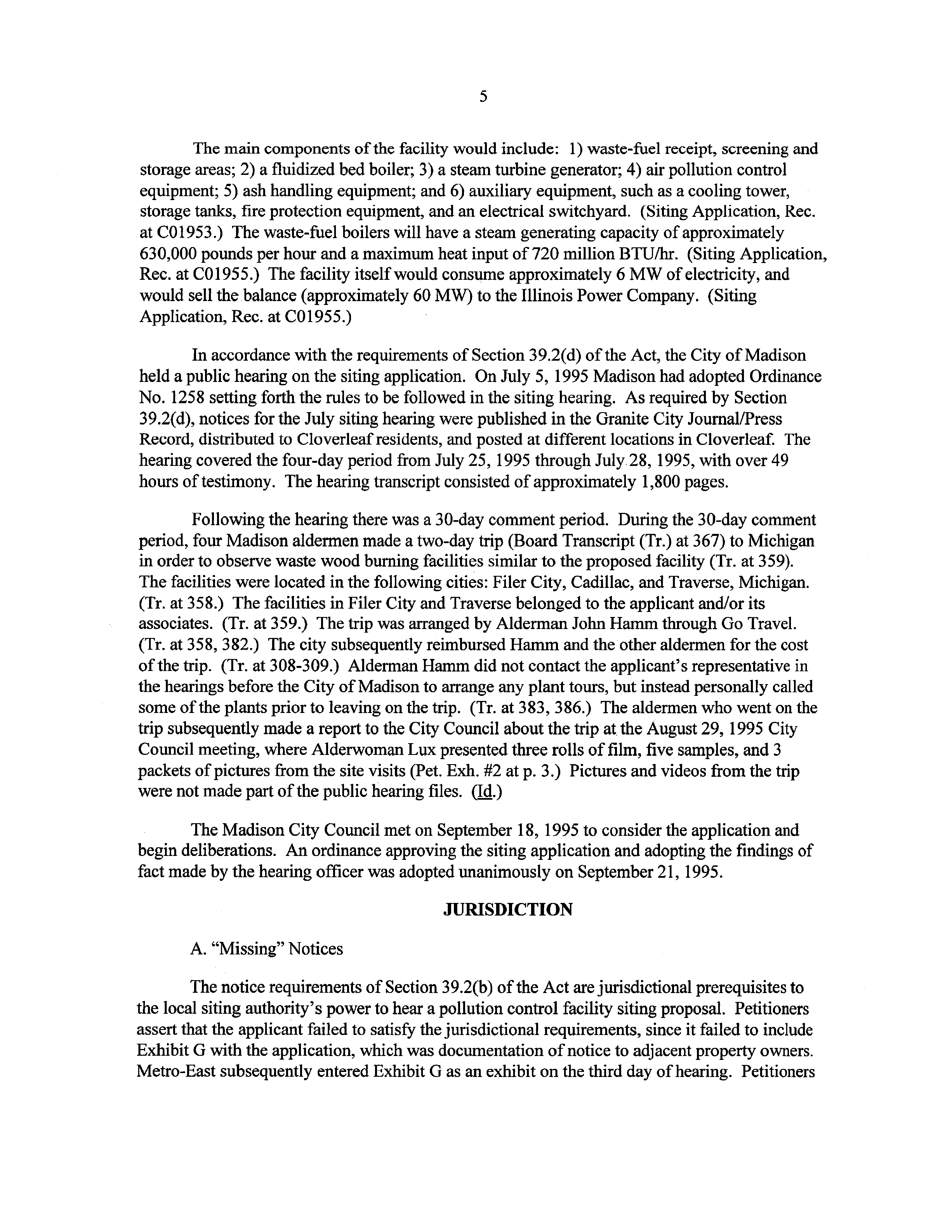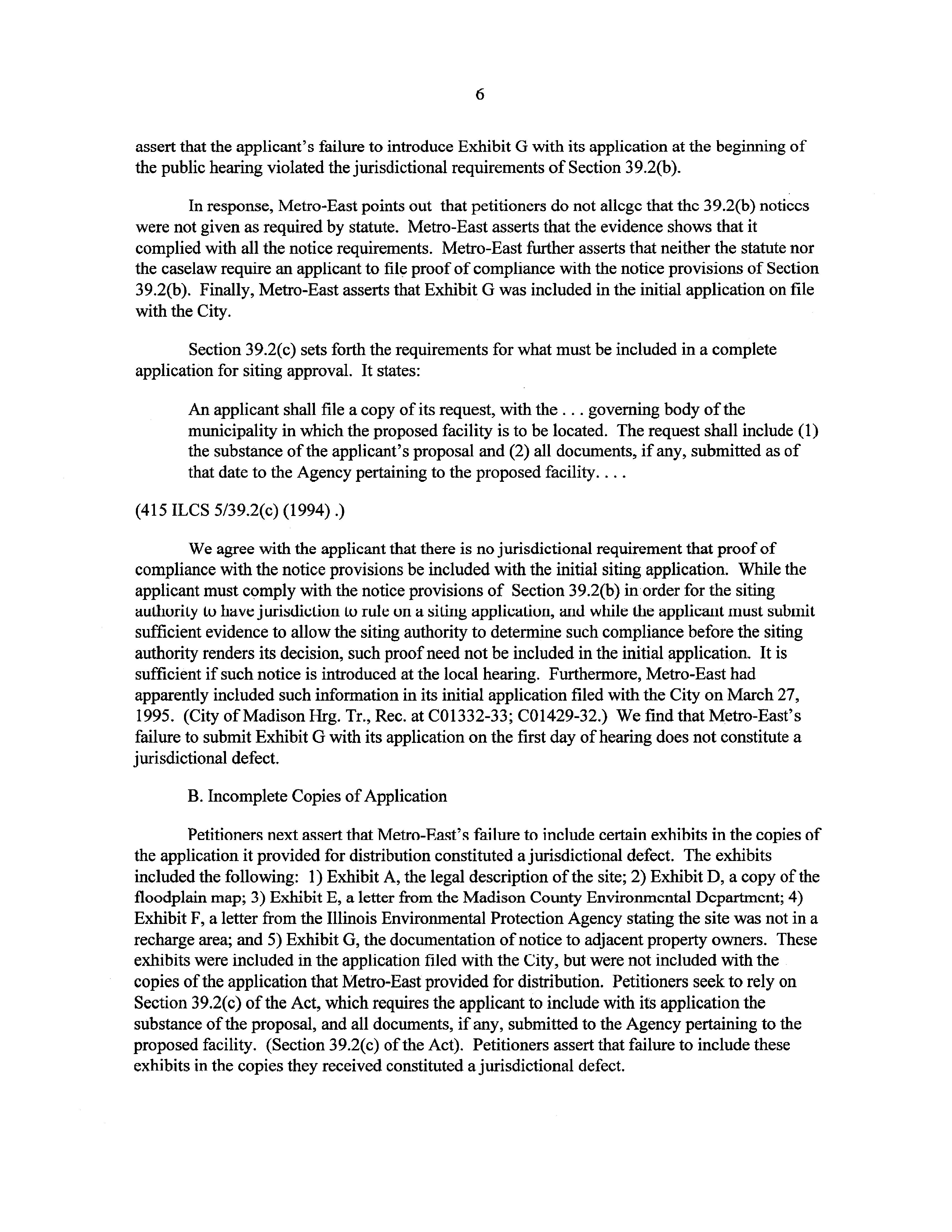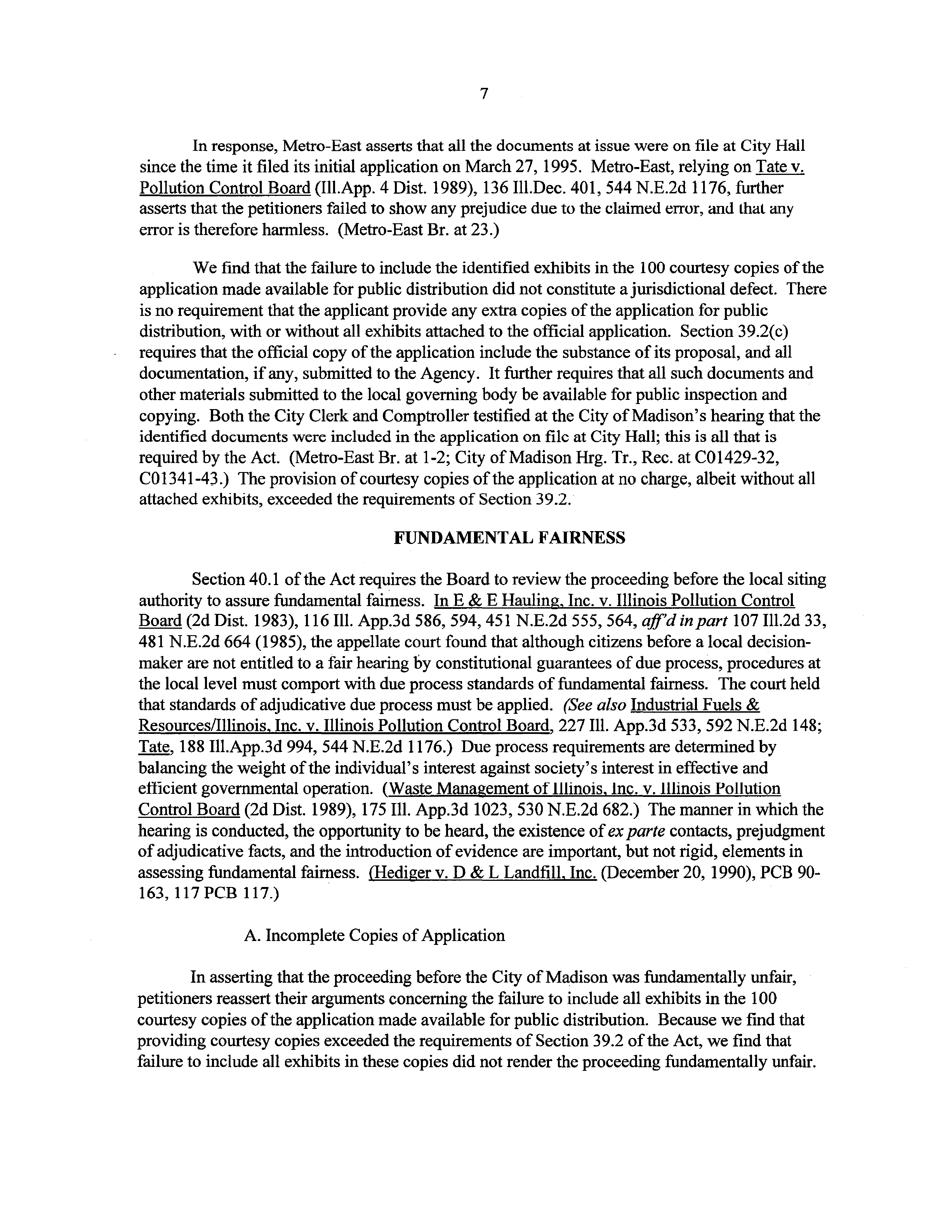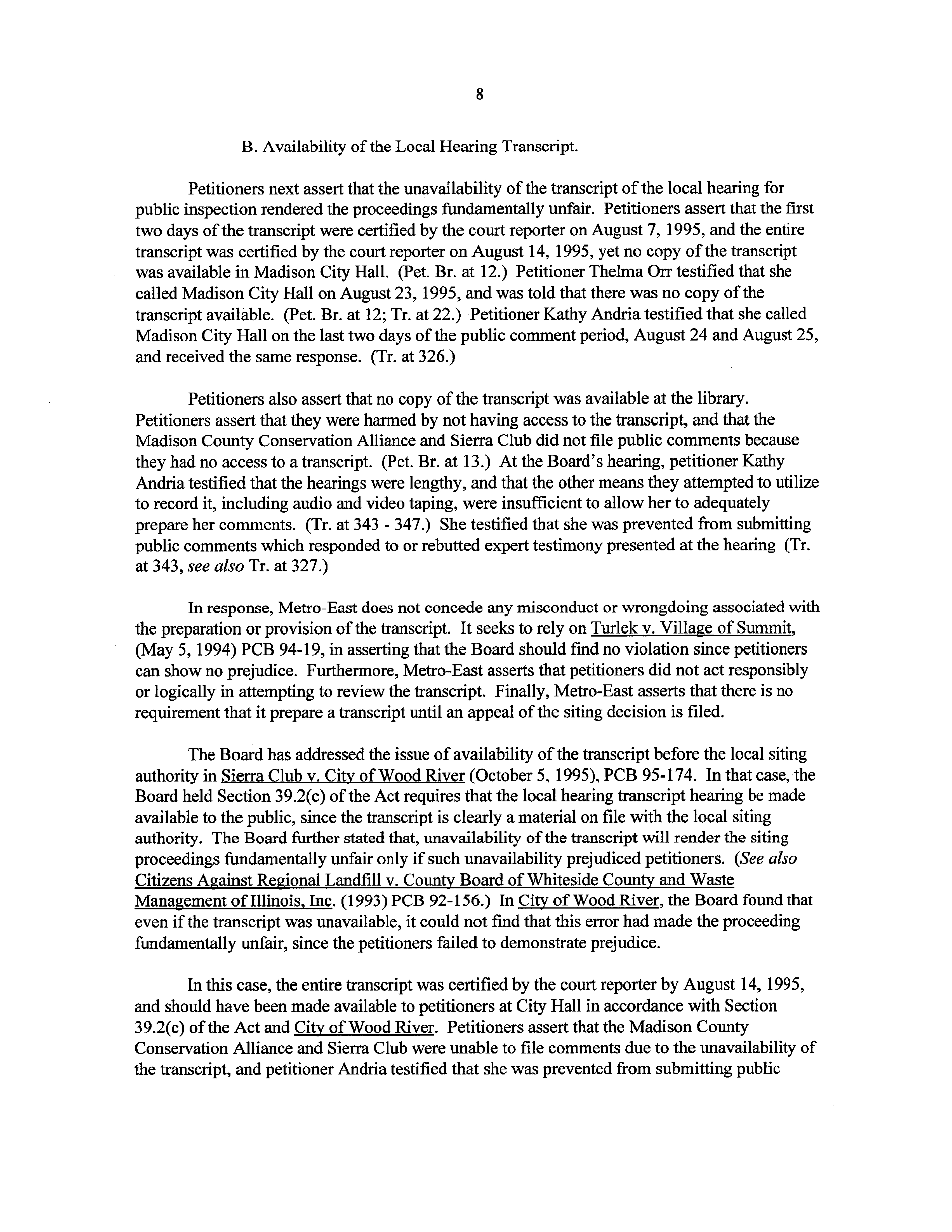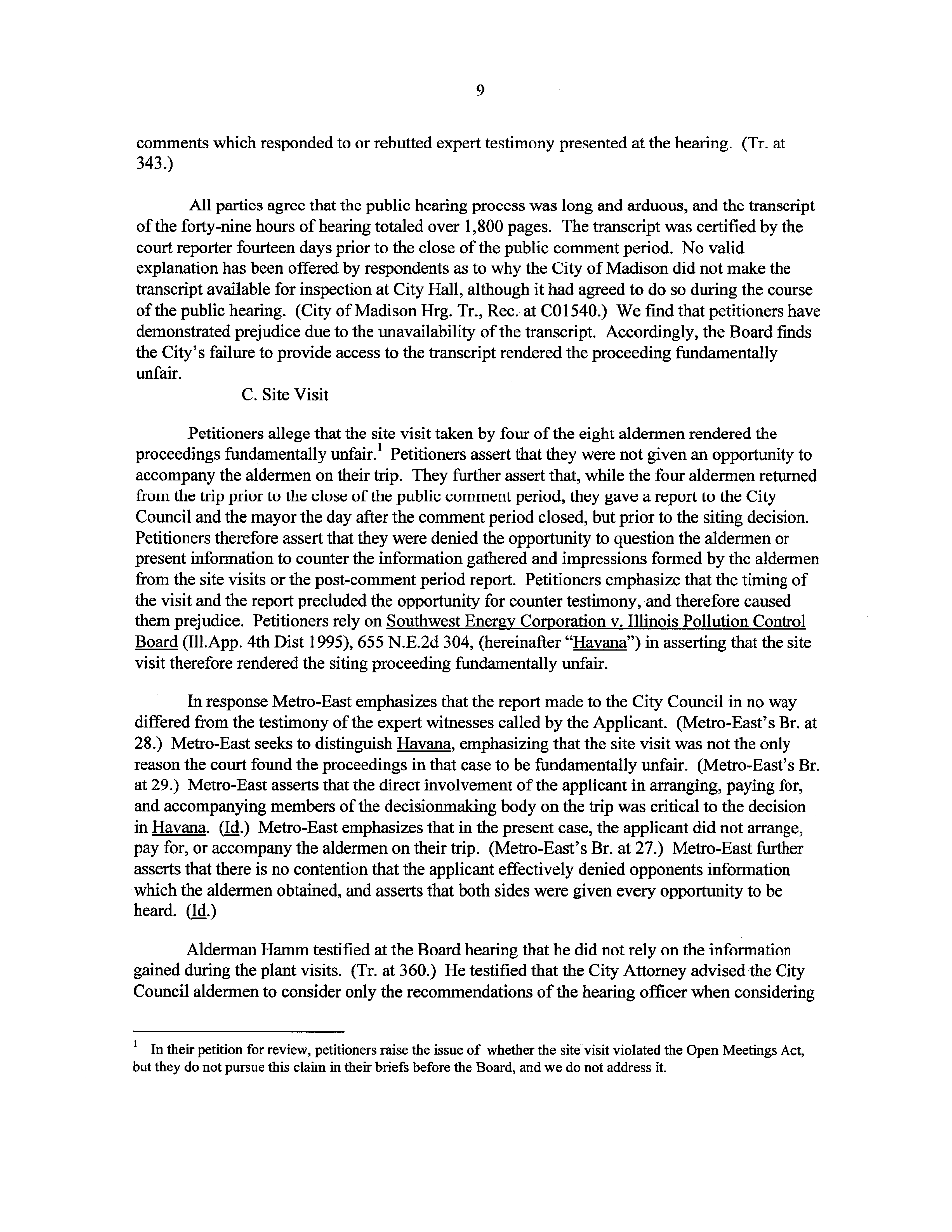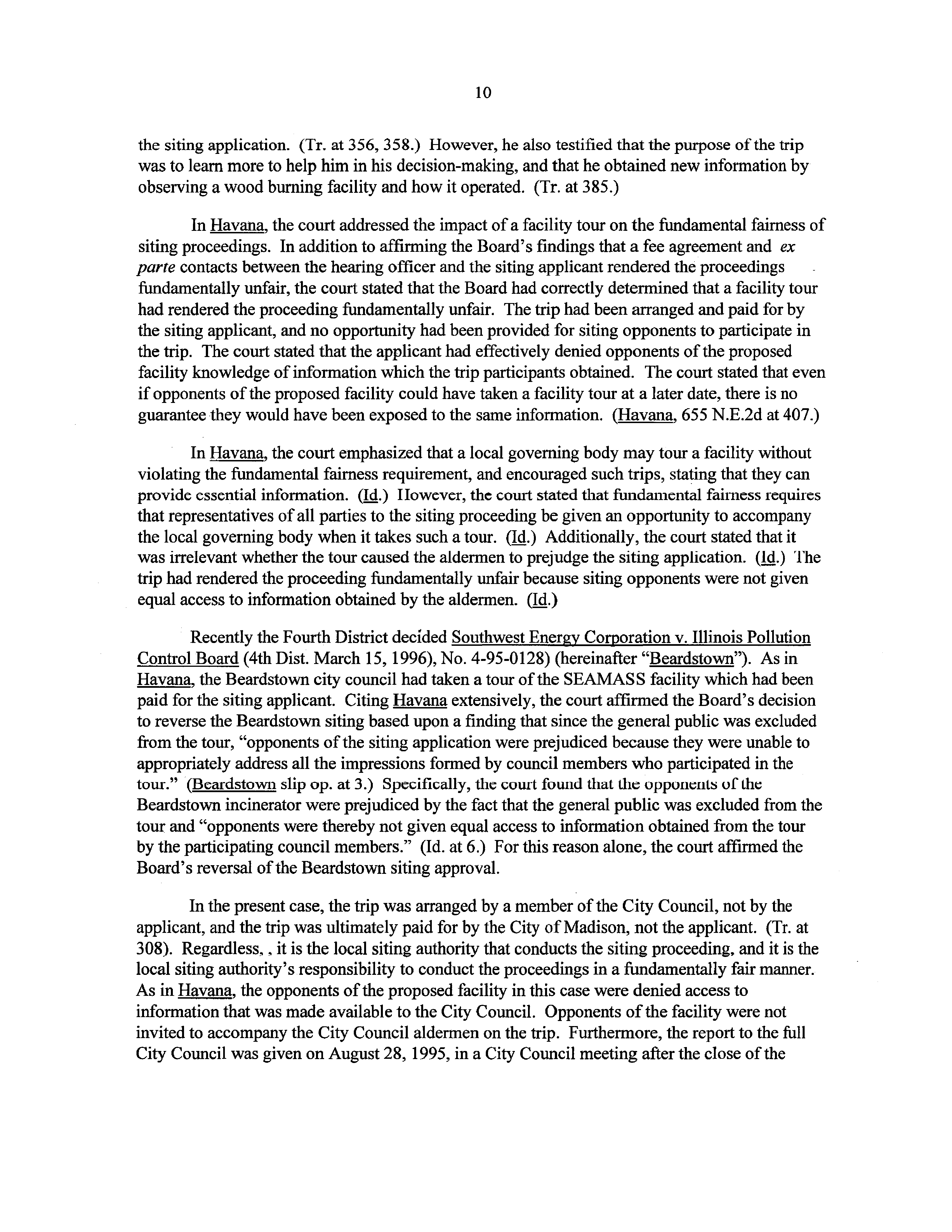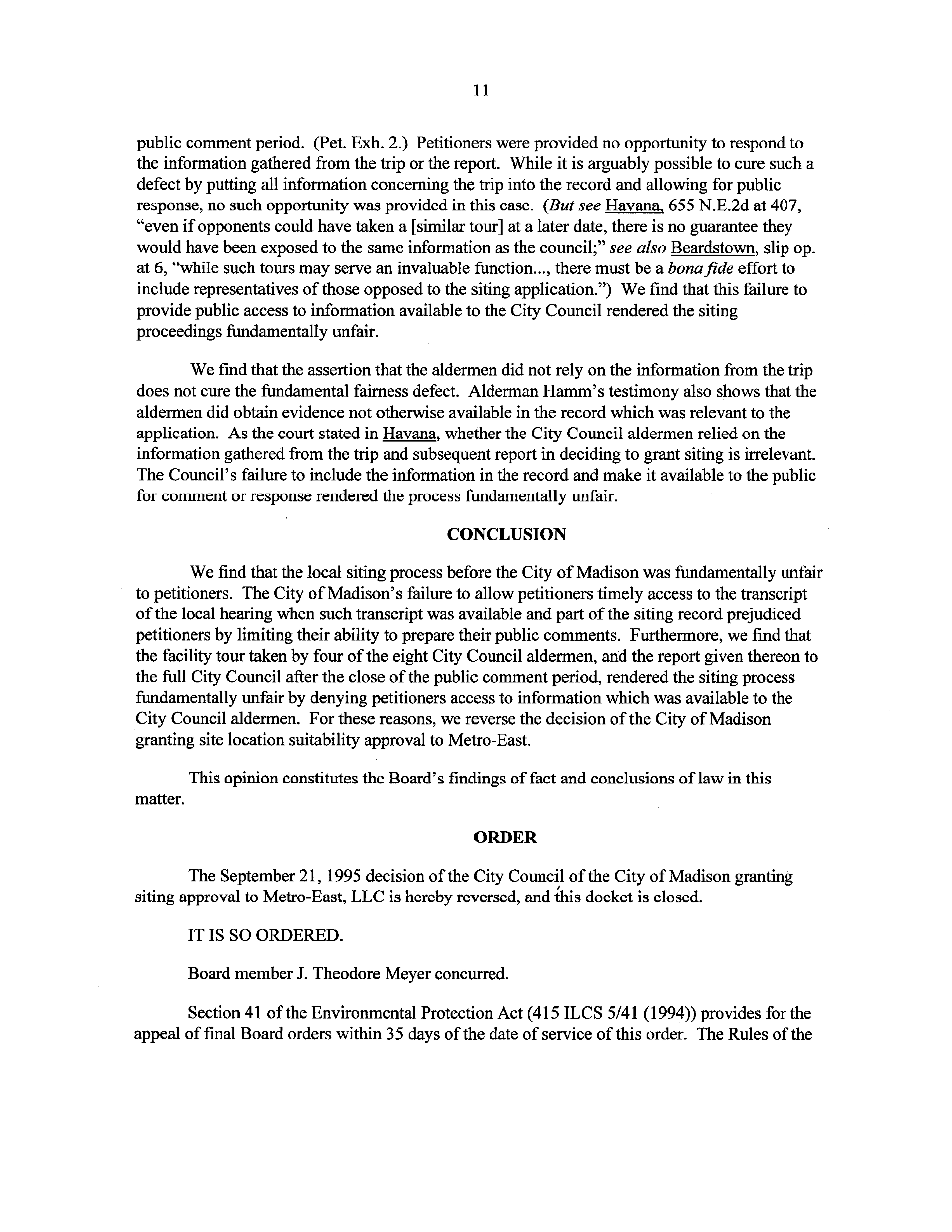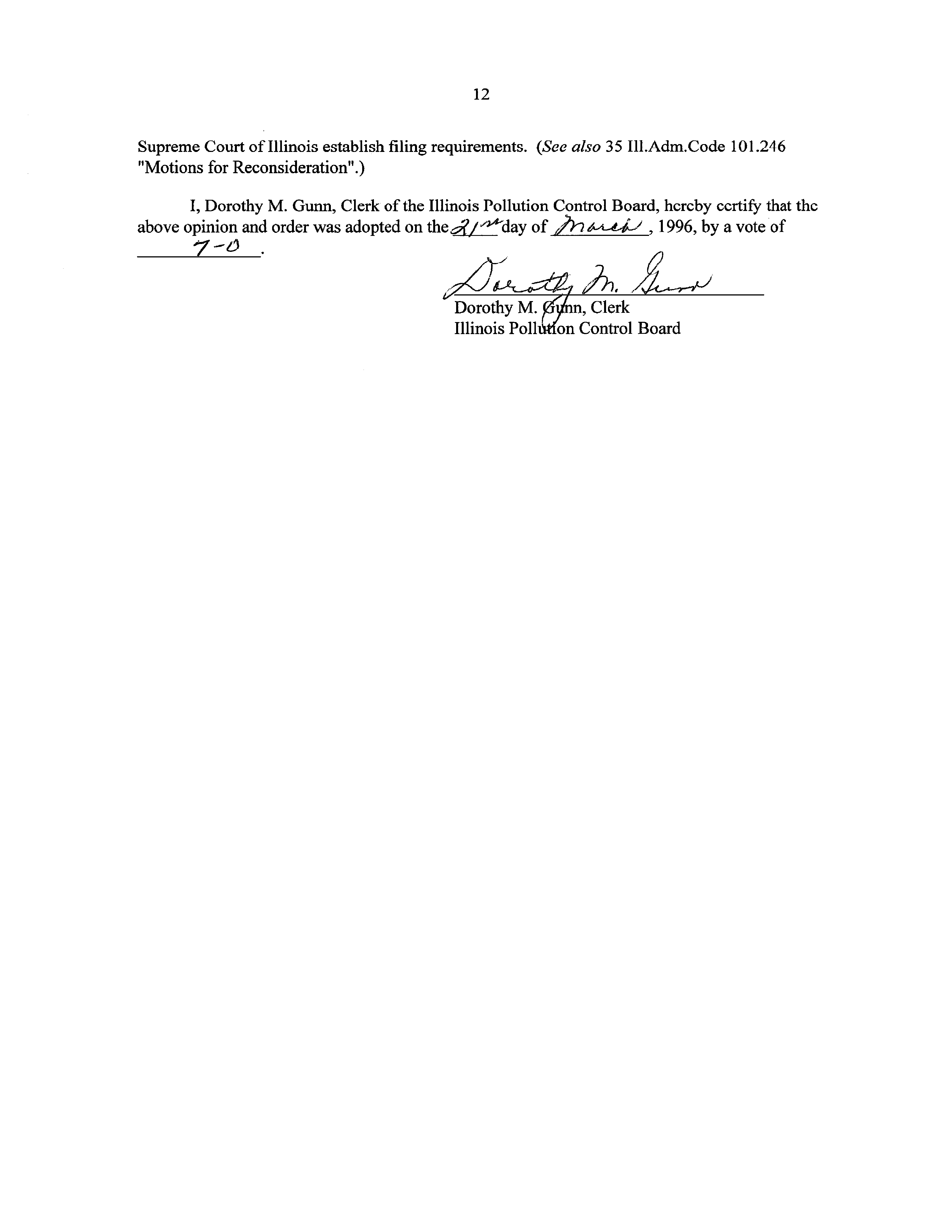ILLINOIS
POLLIJI ION
CONtROL
BOARD
March21,
1996
SPILL, MADISON COUNTY
)
CONSERVATION ALLIANCE, SIERRA
)
CLUB,
NAMIEOKI
TOWNSHIP CLERK
)
HELEN HAWKINS, KATHY ANDRIA,
)
SHIRLEY
CRAIN,
GLENDA FULKERSON,)
JOHN GALL, THELMA ORR, RON SHAW,)
AND PEARL
STOGSDILL,
)
)
Petitioner,
)
)
v.
)
PCB 96-9 1
)
(Pollution Control Facility Siting
CITY OF MADISON, AND METRO-EAST,
)
Appeal)
LLC,
)
)
Respondents.
)
)
KATHY
ANDRIA
APPEARED
ON BEHALF
OF PETITIONER SPILL
AND
ON HER
OWN
BEHALF;
JIM BENSMAN APPEARED ON BEHALF OF PETITIONER SIERRA CLUB;
JOHN T. PAPA,
CALLIS, PAPA, JENSEN, JACKSTADT & HALLORAN, P.C., APPEARED
ON BEHALF OF RESPONDENT METRO-EAST, LLC;
CASPER NIGHOHOSSIAN, CITY ATTORNEY FOR THE CITY OF MADISON,
APPEARED ON BEHALF OF RESPONDENT THE CITY OF MADISON.
OPINION
AND
ORDEROF THE BOARD (by M. McFawn):
This matter is before the Board on a petition for review filed by petitioners SPILL,
Madison
County
Conservation Alliance, Sierra Club, Nameoki Township Clerk Helen Hawkins,
Kathy Andria,
Shirley Cram, Glenda Fulkerson, John Gall, Thelma On, Ron Shaw, and Pearl
Stogsdill (Petitioners).
The petitioners seek review ofa September 21,
1995 order issued by the
City Council ofthe City ofMadison, granting site location suitability approval to Metro-East,
LLC (Metro-East) for the construction of a regional pollution control facility; the facility in this
case is an incinerator.
Petitioners filed their appeal pursuant to Section 40.1
(b) ofthe
Environmental Protection Act (Act)
(415
ILCS 5/40.1(b) (1994)).
Petitioners filed their initial
2
appeal on October 30,
1995.
Pursuant to a Board order dated November 2,
1995, petitioners filed
an amended petition on November 20,
1995 in order to cure deficiencies in the initial petition.
A hearing was held in this matter on January 8,
1996, before Chief Hearing Officer
Michael Wallace, which members ofthe public attended~Petitioners filed their post-hearing
briefon January 31,
1996, accompanied by a motion to file instanter.
Respondent Metro-East
filed its post-hearing briefon February 13,
1996.
Respondent City of Madison filed its post-
hearingbriefon February 27, 1996, wherein the City of Madison adopted Metro-East’s briefand
made additional arguments.
Also onFebruary 27, 1996, petitioners filed a response to
respondents’ post-hearingbrief, as well as a motion to supplement the record in response to
respondents’ post-hearingbriefs and alist of citations missing from their post-hearing briefand
response, accompanied by a motion to file instanter.
On March 4,
1996, respondent Metro-East
filed a motion to strike petitioner’s February 27, 1996 response to respondents’ post-hearing
briefs.
On March
11, 1996, respondent filed a response to petitioners’ March 1,
1996 filing.
Petitioners challenge the siting approval granted by the City of Madison to Metro-East on
amultitude of grounds, including the following:
1) the City of Madison lackedjurisdiction to
grant siting since Metro-East filed an incomplete siting application; 2) the siting proceedingwas
fundamentally unfair because Metro-East filed an incomplete application; 3) the unavailability of
the hearing transcript rendered the proceeding fundamentally unfair; 4) a site visitto several of
the applicant’s facilities by four of the City Council aldermen rendered the proceedings
fundamentally unfair;
5) the hearing was conducted in a manner which was fundamentally unfair;
6) the applicant failed to demonstrate that the facility was necessary to accommodate the waste
needs of the area intended to be served; 7) the applicant failed to demonstrate that the proposed
facility is designed, located, and proposed to be operated in a mannerthat will assure that the
public health,
safety, and welfare will be protected; 8) the site is located within the 100-year
floodplain.
For the reasons set forth below, the Board finds that the proceedings before the City
of Madison were fundamentally unfair, andthe Board therefore reverses the City of Madison’s
decision granting
site location suitability approval to Metro-East.
Because we find that the failure to make the transcript availablefor public inspection and
the site visit taken by four of the eight aldermen rendered the siting proceeding fundamentally
unfair, we will not address petitioners’ challenges conceming the siting criteria.
Furthermore, we
will not address those challenges to the siting decision whichwere raised in the petitionfor
review, but for which no argument was submitted in petitioners’
filings.
Preliminarymotions.
As apreliminary matter, we will address the outstanding motions.
First, on January 31,
1996, petitioners filed a motion to file their post-hearing brief instanter.
Pursuant to the hearing
officer’s January
12, 1996 scheduling order, petitioners’ post-hearing brief was due January 29,
1996.
The motion is granted, and petitioners’ post-hearing briefis accepted.
Second, on February 27, 1996, petitioners filed “Petitioners’ Response to Respondents’
Post-Hearing Brief” This filing seeks to respond to the allegations in respondents’ post-hearing
brief, and is properly characterized as petitioners’ reply brief
Pursuant to the hearing officer’s
3
January 12,
1996 scheduling order, petitioners’ reply briefwas due to be filed on February 20,
1996. On March 4,
1996 respondent Metro-East filed a motion to
strike petitioner’s reply brief
Petitioners filed a response to the motion to
strike on March
5,
1996.
Metro-East also filed a
reply to petitioner’s response to the motion to strike on March
11,
1996.
In its March 4,
1996 motion to strike, Metro-East points out that petitioners’ reply brief
was due February 20,
1996, and that the proofof service attached to petitioner’s reply brief
shows that it was mailed on February 21,
1996.
Metro-East further asserts that the reply brief
contains numerous references to materials outside the record, and at least twenty instances where
no page number is given for a claimed record reference.
In their March
5,
1996 response to the
motion to strike, petitioners assert that they were confused as to the date their briefwas due, and
assert avariety of hardships which prevented the timely filing of their brief
Metro-East’s March
11,
1996 reply asserts that a party which chooses to proceed
pro se
must comply with the same
rules of proceedings as an attomey, and recites case authority to support this assertion.
While it is true that
pro se
parties must comply with the same rules as an attorney, we
findthat petitioners’ filing of their briefone day late has not causedprejudice to respondents,
since this was the final filing before close of the record.
We further find that accepting
petitioners’ reply briefwill contribute to a complete resolution of the issues in this matter.
Accordingly, we deny Metro East’s March 4,
1996 motion to strike and accept petitioners’
February27,
1996 reply brief
Also on February 27, 1996,petitioners filed a “Motion to Supplement the Record in
Response to Respondents’ Post-Hearing Briefs and Citations Missing from Petitioners’ Post-
Hearing Brief and Response” (Motion to
Supplement), accompanied by a motion to file instanter.
In the Motion to Supplement, petitioners seek to respond to “inaccurate statements” in
respondents’ post-hearing briefs, and to add citations to the record for their post-hearing briefand
reply brief
Respondents have not responded to this filing.
This filing is, in essence, asecond
reply briefby petitioners, andthere was no provision forthis filing in the hearing officer’s
January
12, 1996 scheduling order.
Therefore, the motion to file instanter is denied, andthe
motion to
supplementis rejected.
STATUTORY FRAMEWORK
At the local level, the siting process is governed by Section 39.2 ofthe Act.
Section 39.2
provides that local authorities are to consider as many as nine criteria when reviewing an
application for siting approval.
These statutory criteria arc the only issues which can be
considered when ruling on an application for siting approval.
In this case, the City of Madison
found that all of the applicable criteria had been satisfied, and therefore granted siting approval to
Metro-East.
When reviewing a local authority’s siting decision the Board is authorized to reviewthe
areas ofjurisdiction and fundamental fairness.
Section 40.1 ofthe Act requires the Board to
reviewthe procedures used at the local level to determine whether those procedures were
fundamentally fair.
E & EHauling. Inc. v. Pollution Control Board(2d Dist.
1983),
116
Ill.App.3d 586,
451
N.E.2d
555, 562, aff’d inpart
(1985)
107 Ill.2d 33, 481 N.E.2d 664.)
In this
4
case the petitioners have raised both jurisdictional and fi.mdamental fairness challenges, in
addition to challenges based on failure to satisfy the siting criteria.
When reviewing a local authority’s decision on the criteria, the Board must determine
whether the local decision is against the manifest weight of the evidence.
(McLean County
Disposal, Inc. v. County of McLean (4th Dist. 1991), 207 I1l.App.3d 352, 566 N.E.2d 26,29;
Waste Management of Illinois, Inc. v. Pollution Control Board (2dDist.
1987).
160 lll.App.3d
434, 513 N.E.2d
592,
E & E Hauling. Inc.
v. Pollution Control Board (2d Dist.
1983),
116
Ill.App.3d 586, 451 N.E.2d
555, aff’d inpart (1985)
107 Ill.2d 33, 481 N.E.2d 664.)
BACKGROUND
Metro-East, LLC, a Connecticut Limited Liability Company (Siting Application, City of
Madison Record (Rec.)
at C01951), filed its application for siting approval for a “New Pollution
Control Facility to Generate Electricity from the Combustion of Waste Fuel” with the City
Madison on March 27,
1995.
(Siting Application, Rec. at C01949.)
Metro-East also provided
the City of Madison with
100 courtesy copies ofthe application that did not include the large or
bulky exhibits.
The application was put on file at the Madison City Hall.
A complete copy of
the application was also put on file atthe Madison Public Library.
The application states that the proposed facility would “provide resource recovery to the
region through the collection and processing of wood waste and recovery of waste coal.”
The
proposed facility would “clean” bum the processed wood waste and recovered waste coal using
proven technology.
The proposed facility would be located in the Cityof Madison,
approximately one mile north of the intersectionof Route 203 and 1-55/70, directly behind Old
Nickel Plate Yard Road.
(Siting Application, Rec. at C01952.)
The site consists of two parcels
of land constituting approximately 47 acres of land.
The site is currently used as asource for
clay and soil material, and is zoned for industrial operations.
The site abuts the Cloverleaf
section of Madison County, a residential area~.
The application states that the proposed facility’s primary purpose is to serve the region’s
wood waste disposal needs.
The primary service area for the facility is Madison County, while a
secondary service area for the facility would include all municipalities and counties within a
seventy-five mile radius.
(Siting Application, Rec. at CO1958.)
On average, the project would
convcrt 865 tons pcr day ofwood waste and 370 tons per day of recovered waste coal to
electricity.
Annually, this translates to approximately 300,000 tons of wood and 130,000 tons of
coal.
The wood waste would include tree trimmings, stumps, sander dust, pallets, boxes,
timbers from old homes, railroad ties and telephone poles.
Sources of this wood waste would
include manufacturers, municipalities, land clearing operators, construction and demolition
companies, commercial and institutional operations, individuals, utilities, andrailroad
companies.
Recovered coal waste will originate from abandoned land and current coal
operations.
5
The main components of the facility would include:
1) waste-fuel receipt, screening and
storageareas;
2) a fluidized bed boiler; 3) a steam turbine generator; 4) air pollution control
equipment;
5)
ash handling equipment; and 6) auxiliary equipment, such as a cooling tower,
storage tanks, fire protection equipment, and an electrical switchyard.
(Siting Application, Rec.
at CO
1953.)
The waste-fuel boilers will have a steam generating capacity of approximately
630,000 pounds per hour and amaximum heat input of 720 million BTU/hr.
(Siting Application,
Rec. at CO
1955.)
The facility itself would consume approximately 6 MW of electricity, and
would sell the balance (approximately 60 MW) to the Illinois Power Company.
(Siting
Application, Rec. atC01955.)
In accordance with the requirements of Section 39.2(d) of the Act, the City ofMadison
held a public hearing on the siting application.
On July
5,
1995 Madison had adopted Ordinance
No.
1258 setting forth the rules to be followed in the siting hearing.
As required by Section
39.2(d), notices for the July siting hearing were published in the Granite CityJournal/Press
Record, distributed to Cloverleaf residents, and posted atdifferent locationsin Cloverleaf
The
hearing covered the four-day period from July 25,
1995 through July. 28,
1995, with over 49
hours oftestimony.
The hearing transcript consisted of approximately
1,800pages.
Following the hearing there was a30-day comment period.
During the 30-day comment
period, four Madison aldermen made atwo-day trip (Board Transcript (Tr.) at 367) to Michigan
in order to observe waste wood burning facilities similar to the proposed facility (Tr. at 359).
The facilities were located in the following cities: Filer City, Cadillac, and Traverse, Michigan.
(Tr. at
358.)
The facilities in Filer City and Traverse belonged to the applicant and/or its
associates.
(Tr. at
359.)
The trip was arranged by Alderman John Hamm through Go Travel.
(Tr. at 358, 382.)
The city subsequently reimbursed Hamm and the other aldermen forthe cost
of the trip.
(Tr. at 308-309.)
Alderman Hamm did not contact the applicant’s representative in
the hearings before the City of Madison to arrange any plant tours, but instead personally called
some of the plants prior to leaving on the trip.
(Tr. at383, 386.)
The aldermen who went on the
trip subsequently made a report to the City Council about the trip at. the August 29,
1995
City
Council meeting, where Alderwoman Luxpresented three rolls of film, five samples, and 3
packets ofpictures from the site visits (Pet. Exh. #2 at p. 3.)
Pictures and videos from the trip
were not made part of the public hearing files.
(j4.)
The Madison City Council met on September 18,
1995 to consider the application and
begin deliberations.
An ordinance approving the siting applicationand adoptingthe findings of
fact made by the hearing officer was adopted unanimously on September 21,
1995.
JURISDICTION
A. “Missing” Notices
The notice requirements of Section 39.2(b) ofthe Act arejurisdictional prerequisites to
the local siting authority’s power to hear a pollution control facility siting proposal.
Petitioners
assert that the applicant failed to satisfy the jurisdictional requirements, since
it failed to include
Exhibit G with the application, which
was
documentation ofnotice to adjacent propertyowners.
Metro-East subsequently entered Exhibit G as an exhibit on the third day ofhearing.
Petitioners
6
assert that the applicant’s failure to introduce Exhibit G with its application
at the beginning of
the public hearing violated the jurisdictional requirements of Section
39.2(b).
In response, Metro-East points out
that petitioners do not allege that thc 39.2(b) noticcs
were not given as required by statute.
Metro-East asserts that the evidence shows that it
complied with all the notice requirements.
Metro-East further asserts that neither the statute nor
the caselaw require an applicant to file proofof compliance with the notice provisions of Section
39.2(b).
Finally, Metro-East asserts that Exhibit G was included in the initial application on file
with the City.
Section 39.2(c) sets forth the requirements for what must be included in a complete
applicationfor siting approval.
Itstates:
An applicant shall file acopy of its request, with the.
.
.
governing body ofthe
municipality in which the proposed facility is to be located.
The request shall include (1)
the substance of the applicant’s proposal and (2) all documents, if any, submitted as of
that date to the Agency pertaining to the proposed facility.
(415 ILCS
5/39.2(c)
(1994).)
We agree with the applicant that there is no jurisdictional requirement that proof of
compliance with the notice provisions be included with the initial siting application.
While the
applicant must comply with the notice provisions of
Section
3 9.2(b) in order for the siting
authority to have
j
urisdietiori to rule on a suing application, and while the applicant must
submit
sufficient evidence to
allow the siting authorityto determine such compliancebefore the siting
authority renders its decision, such proof need not be included in the initial application.
It is
sufficient ifsuch notice is introduced at the local hearing.
Furthermore, Metro-East had
apparently included such informationin its initial application filed with the City on March 27,
1995.
(City of Madison Hrg. Tr., Rec. at C01332-33; C01429-32.)
We find that Metro-East’s
failure to submit Exhibit 0 with its application on the first day of hearing does not constitute a
jurisdictional defect.
B. Incomplete Copies of Application
Petitioners next assert that Metro-East’s failure to include certain exhibits in the copies of
the application it provided for distribution constituted ajurisdictional defect.
The exhibits
includedthe following:
1) Exhibit A, the legal description of the site; 2) Exhibit D, a copy of the
floodplain map;
3) Exhibit E, a letter
from
the Madison County Environmcntal Dcpartmcnt; 4)
Exhibit F, aletter from the Illinois Environmental Protection Agency stating the site was not in a
recharge area; and
5)
Exhibit 0, the documentation of notice to adjacent property owners.
These
exhibits were included in the application filed with the City, but were not included with the
copies of the applicationthat Metro-East provided for distribution.
Petitioners seek to rely on
Section 39.2(c) of the Act, which requires the applicant to include with its applicationthe
substance of the proposal, and all documents, if any, submitted to the Agency pertaining to the
proposed facility.
(Section 39.2(c) of the Act).
Petitioners assert that failure to include these
exhibits in the copies they received constituted ajurisdictional defect.
7
In response, Metro-East asserts that all the documents at issue were on file at City Hall
since the time it filed its initial application on March 27,
1995.
Metro-East, relying on Tate v.
Pollution Control Board (Ill.App. 4 Dist.
1989),
136 Ill.Dec. 401, 544 N.E.2d
1176, further
asserts that the petitioners failed to show any prejudice due to the claimed error, and that any
error is therefore harmless.
(Metro-East Br. at 23.)
We find that the failure to include the identified exhibits in the 100 courtesy copies ofthe
application made available for public distribution did not constitute ajurisdictional defect.
There
is no requirement that the applicant provide any extra copies of the application for public
distribution, with or without all exhibits attached to the official application.
Section 3 9.2(c)
requires that the official copy of the application include the substance of its proposal, and all
documentation, if any, submitted to the Agency.
It further requires that all such documents and
other materials submitted to the local governing body be available for public inspection and
copying.
Both the City Clerk and Comptroller testified at the Cityof Madison’s hearing that the
identified documents were included in the application on filc at City Hall; this is all that is
required by the Act.
(Metro-East Br. at 1-2; City ofMadison Hrg. Tr., Rec. at C01429-32,
C0l341-43.)
The provision of courtesy copies ofthe application at no charge, albeit without all
attached exhibits, exceeded the requirements of Section 39.2.
FUNDAMENTAL FAIRNESS
Section
40.1
ofthe Act requires the Board to review the proceeding before the local siting
authority to assure fundamental fairness.
In E & P Hauling, Inc. v. Illinois Pollution Control
Board (2d Dist.
1983),
116 Ill. App.3d 586, 594, 451 N.E.2d
555, 564, aff’dinpart
107 Ill.2d 33,
481 N.E.2d 664 (1985), the appellate court found that although citizens before a local decision-
maker are not entitled to a fair hearing by constitutional guarantees of due process, procedures at
the local level must comport with due process standards of fundamental fairness.
The court held
that standards of adjudicative due process must be applied.
(See also
Industrial Fuels &
Resources/Illinois,
Inc. v. Illinois
Pollution Control Board, 227 Ill. App.3d 533, 592 N.E.2d 148;
J1t~~
188 Ill.App.3d 994, 544 N.E.2d
1176.)
Due process requirements are determined by
balancing the weight ofthe individual’s interest against society’s interest in effective and
efficient governmental operation.
(Waste Management of Illinois.Inc.
v. Illinois Pollution
Control Board (2d Dist.
1989),
175 Ill. App.3d 1023, 530 N.E.2d 682.)
The manner in which the
hearing is conducted,the opportunity to be heard, the existence of
exparte
contacts, prejudgment
of adjudicative facts, andthe introduction of evidence are important, but not rigid, elements in
assessing fundamental fairness.
(Hediger v. D & L Landfill. Inc. (December 20, 1990), PCB 90-
163,
117 PCB
117.)
A. Incomplete Copies of Application
In asserting that the proceeding before the City of Madison was fundamentally unfair,
petitioners reassert their arguments concerning the failure to include all exhibits in the
100
courtesy copies of the application made available for public distribution.
Because we find that
providing courtesy copies exceeded the requirements of Section 39.2 of the Act, we find that
failure to include all exhibits in these copies did not render the proceeding fundamentally unfair.
8
B. Availability of the Local Hearing Transcript.
Petitioners nextassert that the unavailability of the transcript ofthe local hearing for
public inspection rendered the proceedings fundamentally unfair.
Petitioners assert that the first
two days ofthe transcript were certified by the court reporter on August 7, 1995, and the entire
transcript was certified by the court reporter on August
14,
1995, yet no copy of the transcript
was available in Madison City Hall.
(Pet. Br. at 12.)
Petitioner Thelma On testified that she
called Madison City Hall on August 23, 1995, and was told that there was no copy of the
transcript available.
(Pet.
Br. at 12; Tr. at 22.)
Petitioner Kathy Andria testified that she called
Madison City Hall on the last two days of the public comment period, August 24 and August
25,
and received the same response.
(Tr. at 326.)
Petitioners also assert that no
copy of the transcript was available atthe library.
Petitioners assert that they were harmed by not having access to the transcript, and that the
Madison County Conservation Alliance and Sierra Club did not file public comments because
they had no access to atranscript.
(Pet. Br. at 13.)
At the Board’shearing, petitioner Kathy
Andria testified that the hearings were lengthy, and that the other means they attempted to utilize
to record it, including audio andvideo taping, were insufficient to allow her to adequately
prepare her comments.
(Tr. at343
-
347.)
She testified that shewas prevented from submitting
public comments which responded to or rebutted expert testimony presented at the hearing
(Tr.
at 343,
see also
Tr. at 327.)
In response, Metro-East does not concede any misconduct or wrongdoing associated with
the preparation or provisionof the transcript.
It seeksto rely on Turlek v.
Village of Summit,
(May
5,
1994) PCB 94-19, in asserting that the Board should find no violation since petitioners
can show no prejudice.
Furthermore, Metro-East asserts that petitioners did not act responsibly
or logically in attempting to reviewthe transcript.
Finally, Metro-East asserts that there is no
requirement that it prepare atranscript until an appeal of the siting decision is filed.
The Board has addressed the issue of availability ofthe transcript before the local siting
authority in Sierra Cub v. City of Wood River (October
5,
1995), PCB 95-174.
In that case, the
Board held Section 39.2(c) of the Act requires that the local hearing transcript hearing be made
available to the public, since the transcript is clearly a material on file with the local siting
authority.
The Board furtherstated that, unavailability ofthe transcript will render the siting
proceedings fundamentally unfair only ifsuch unavailability prejudiced petitioners.
(See also
Citizens Against Regional Landfill v.
County Board of Whiteside County and Waste
Management of Illinois, Inc.
(1993) PCB
92-156.)
In City of Wood River, the Board foundthat
even ifthe transcript was unavailable, it could not find that this error hadmade the proceeding
fundamentally unfair, since the petitioners failed to demonstrate prejudice.
In this case, the entire transcript was certified by the court reporter by August 14,
1995,
and should have been made available to petitioners at City Hall in accordance with Section
39.2(c) of the Act and City of Wood River.
Petitioners assert that the Madison County
Conservation Alliance and Sierra Club were unable to file comments due to the unavailability of
the transcript, and petitioner Andria testified that she was prevented from submitting public
9
comments which responded to or rebutted expert testimony presented at the hearing.
(Tr. at
343.)
All parties agree that thc public hearingprocess was long and arduous, and the transcript
of the forty-nine hours of hearing totaled over
1,800pages.
The transcript was certified by the
court reporter fourteen days prior to the close of the public comment period.
No valid
explanation has been offeredby respondents as to why the City of Madison did not make the
transcriptavailable for inspection at City Hall, although it had agreed to do so during the course
of the public hearing.
(City of Madison Hrg. Tr., Rec. at CO 1540.)
We find that petitioners have
demonstrated prejudice dueto the unavailability of the transcript.
Accordingly, the Board finds
the City’s failure to provide access to the transcript rendered the proceeding fundamentally
unfair.
C. Site Visit
Petitioners allege that the site visit taken by four of the eight aldermen rendered the
proceedings fundamentally unfair.’
Petitioners assert that they were not given an opportunity to
accompany the aldermen on their trip.
They furtherassert that, while the four aldermen returned
from the trip
prior
to the close of the public eonnnent period, they gave areport to the City
Council and the mayor the day after the comment period closed, but prior to the siting decision.
Petitioners therefore assert that they were denied the opportunity to question the aldermen or
present informationto counterthe information gatheredand impressions formed by the aldermen
from the site visits or the post-comment period report.
Petitioners emphasize that the timing of
the visitand the report precluded the opportunity for countertestimony, and therefore caused
them prejudice.
Petitioners rely on Southwest Energy Corporation v. Illinois Pollution Control
Board (Ill.App. 4th Dist 1995),
655
N.E.2d 304, (hereinafter “Havana”) in asserting that the site
visit therefore rendered the siting proceeding fundamentallyunfair.
In response Metro-East emphasizes that the report made to the City Council in no way
differed from the testimony of the expert witnesses called by the Applicant.
(Metro-East’s Br. at
28.)
Metro-East seeks to distinguish Havana, emphasizing that the site visit was not the only
reason the court found the proceedings in that case to be fundamentally unfair.
(Metro-East’s Br.
at29.)
Metro-East asserts that the direct involvement ofthe applicant in arranging, paying for,
and accompanying members of the decisionmaking body on the trip was critical to the decision
in Havana.
(j~.)Metro-East emphasizes that in the present ease, the applicant did not arrange,
pay for, or accompany the aldermen on their trip.
(Metro-East’s Br. at 27.)
Metro-East further
asserts that there is no contention that the applicant effectively denied opponents information
which the aldermen obtained, and asserts that both sides were given every opportunity to be
heard.
(Id.)
Alderman Hamm testified at the Boardhearing that he did not rely on the information
gained during the plant visits.
(Tr. at 360.)
He testified that the City Attorney advised the City
Council aldennen to consider only the recommendations of the hearing officer when considering
In their petition for review,
petitioners
raisethe issue of whetherthe site visit violatedthe Open Meetings Act,
but they do not pursue this
claim
in their briefs before the Board, and we do not address it.
10
the siting application.
(Tr. at 356,
358.)
However, he also testified that the purpose of the trip
was to learn more to help him in his decision-making, and that he obtained new informationby
observing awood burning facility and how it operated.
(Tr. at
385.)
In Havana, the court addressed the impact of a facility tour on the fundamental fairness of
siting proceedings.
In addition to affirming the Board’s fmdings that a fee agreementand
ex
pane
contacts between the hearing officer and the siting applicant rendered the proceedings
fundamentally unfair, the court stated that the Board had correctly determined that a facility tour
had rendered the proceeding fundamentally unfair.
The trip had been arranged and paid forby
the siting applicant, and no opportunity had beenprovided for siting opponents to participate in
the trip.
The court stated that the applicant had effectively denied opponents of the proposed
facility knowledge of information which the trip participants obtained.
The court stated that even
if opponents of the proposed facility could have taken a facility tour at a later date, there is no
guarantee they would havebeen exposed to the
same information.
(Havana,
655
N.E.2d at 407.)
In Havana, the court emphasized thata local governing body may tour a facility without
violating the fundamental fairness requirement, and encouragedsuch trips, stating that they can
provide essential information.
(j~.)however, the court stated that fundamental fairness requires
that representatives of all parties to the siting proceeding be given an opportunity to
accompany
the local governing body when it takes such a tour.
(Id.)
Additionally, the court stated that it
was irrelevant whether the tour caused the aldermento prejudge the siting application.
(14.)
The
trip had rendered the proceeding fundamentally unfair because siting opponents were not given
equal access to information obtained by the aldermen.
(Ici.)
Recently the Fourth District decided Southwest Energy Corporation v. Illinois Pollution
Control Board (4thDist. March
15,
1996), No. 4-95-0128) (hereinafter “Beardstown”).
As in
Havana, the Beardstown city council had taken a tour ofthe SEAMASS facility which had been
paid for the siting applicant.
Citing Havana extensively, the court affirmed the Board’s decision
to reversethe Beardstown siting based upon afinding that since the general public was excluded
from the tour, “opponents of the siting application were prejudiced because they were unable to
appropriately address all the impressions formed by council members who participated in the
tour.”
(Beardstown slipop. at 3.)
Specifically, the court found that the opponents of the
Beardstown incinerator were prejudiced by the fact that the general public was excluded from the
tour and “opponents were thereby not given equal access to information obtained from the tour
by the participating council members.”
(Id. at
6.)
For this reasonalone, the court affirmedthe
Board’s reversal of the Beardstown siting approval.
In the present case, the trip was arranged by amember ofthe City Council, not by the
applicant, and the trip was ultimately paid for by the City of Madison, not the applicant.
(Tr. at
308).
Regardless.
it is the local siting authority that conducts the siting proceeding, and it is the
local siting authority’sresponsibility to conduct the proceedings in a fundamentally fair manner.
As in Havana, the opponents ofthe proposed facility in this case were denied access to
information that was made available to the City Council.
Opponents of the facility were not
invited to accompany the City Council aldermen on the trip.
Furthermore, the report to the full
City Council was given on August 28,
1995,
in a City Council meeting after the close of the
11
public comment period.
(Pet. Exh. 2.)
Petitioners were provided no opportunity to respond to
the information gathered from the trip or the report.
While it is arguably possible to cure such a
defect by putting all information concerning the trip into the record and allowing for public
response, no such opportunity was provided in this case.
(Butsee
Havana,
655
N.E.2d at 407,
“even ifopponents could have taken a similar
tour
at a later date, there is no guarantee they
would have been exposed to the same information as the council;”
see also
Beardstown, slipop.
at 6, “while such tours may serve an invaluable fUnction..., there must be a
bonafide
effort to
include representatives of those opposed to the siting application.”)
We find that this failure to
provide public access to information available to the City Council rendered the siting
proceedings fundamentally unfair.
We findthat the assertion that the aldermen did not rely on the information from the trip
does not cure the fundamental fairness defect.
Alderman Hamm’ s testimony also shows that the
aldermen did obtain evidence not otherwise available in the record which was relevant to the
application.
As the
court stated in Havana,
whether the City Council aldermen relied on the
information gathered from the trip and subsequentreport in deciding to grant siting is irrelevant.
The Council’s failure to include the information in the record and make it available to the public
for comnient or response rendered the process fundamentally
unfair.
CONCLUSION
We findthat the local siting process before the City of Madison was fundamentally unfair
to petitioners.
The City ofMadison’s failure to allow petitioners timely access to the transcript
of the local hearing when such transcript was available and
part
of the siting record prejudiced
petitioners by limiting their ability to prepare their public comments.
Furthermore, we find that
the facility tour taken by four of the eight City Council aldermen, and the report given thereon to
the full City Council after the close ofthe public comment period, rendered the siting process
fundamentally unfair by denying petitioners access to information which was available to the
City Council aldermen.
For these reasons, wereverse the decision of the City of Madison
granting site location suitability approvalto Metro-East.
This opinion constitutes the Board’s findings of fact and conclusions of law in this
matter.
ORDER
The September 21, 1995 decision of the City Council of the City of Madison granting
siting approval to Metro-East, LLC is hereby reversed, andthis docket is closed.
IT IS SO ORDERED.
Board member J. Theodore Meyer concurred.
Section
41 of the Environmental Protection Act (415 ILCS 5/41
(1994)) provides forthe
appeal of final Board orders within
35 days of the date of service of this order.
The Rules ofthe
12
Supreme Court of Illinois establish filing requirements.
(Sec also 35
Ill.Adm.Code
101.246
“Motions for Reconsideration”.)
I, Dorothy M. Gunn, Clerk of the Illinois Pollution Control Board, hereby certify that the
above opinion and order was adopted on theo?/”day
of )~-~o_.~i_’
,
1996, by a vote of
7~-O.
Dorothy M. ~inn,
Clerk
hllinois Polittion Control Board


